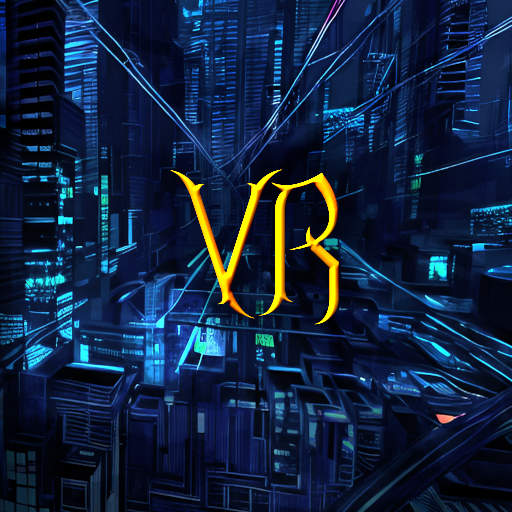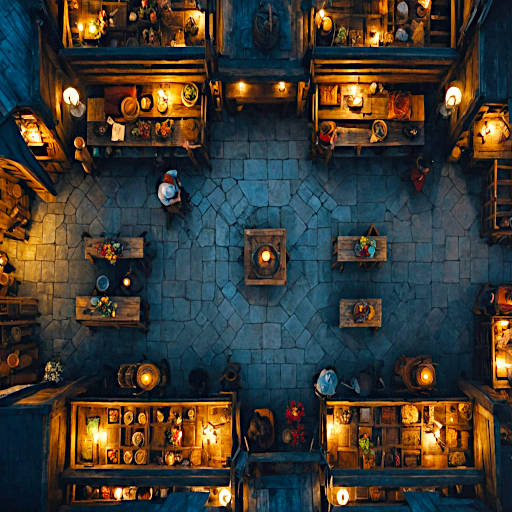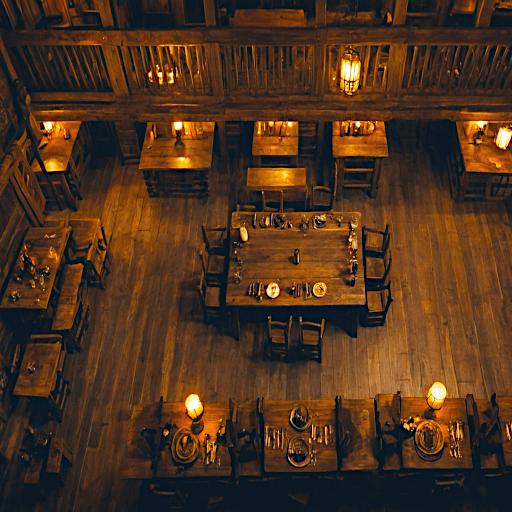Evil In RPGs
Good vs Evil
In many stories, there is the classic conflict of good vs evil. However, it is necessary to define good and evil. These terms are actually relative. What is good for some is evil for another. Everything is relative to how one views the world. Even some of the worst evils of our time were viewed as actually good! The US teaches that Truman decided to drop the atomic bomb on Japan to save millions of lives. Saving lives is good! Those bombs were not dropped on military targets, but on civilian population centers that had no military value. Isn't that an evil war crime? Does good and evil simply depend on who wins the war? Well, basically ... Yes! The winner decides which side is good, so good always wins!
Us vs Them
People like to believe that they are good. Since our brains work on associations, we then associate anything that is like us to be good, because we are good. That must mean that all of us are good! Great! What about them? Well, they aren't like us, so all of them must be evil!
You could say that almost every conflict throughout history is simply us vs them! That gives a whole new way to think about conflicts. Both sides think they are righteous and fighting the good fight. Our protagonists (the PCs in the game) believe they are the heros in the classic fight of good against evil, but now our antagonist (the "BBEG" in many systems) also believes they are on the side of righteousness! Drive your stories from the perspective of someone who believes that their own course of action is the right thing to do, the ultimate good. According to the antagonist, the PCs are the evil ones!
Then Who's Evil?
Virtually Real has Dispositions and a system of Intimacies rather than alignments, so we never actually define anyone as evil. By discovering the intimacies of the antagonist, what they desire, what they fear, and what drives them to get out of bed every day, we can get much richer and meaningful plot developments. The PCs view doesn't change, except for those typically rare moments when they might see things from the viewpoint of the antagonist, and this should be rare unless they specifically seek to discover the antagonist's motives.
Evil Orcs!
What about all the monsters? Can't we just kill them? It's just a game!
Yes and no. It really depends on the type of campaign you are running. In most cases, it just doesn't matter. Can the Paladin slay an Orc who has done nothing wrong without breaking their oath? Well, in a very real sense, they are acting according to their beliefs. Unless the GM really wants to force some sort of awakening, nobody gets bad karma or whatever. However, say an NPC says "Hey! That Orc over there just killed that kid!" and we find the kid was killed by a dagger to the stomach (low for an Orc against a kid) and the Orc doesn't have a dagger anyway. The NPC does! With blood on it! Did the players already kill the Orc? Now the Paladin has broken an oath because they have been faced with the fact that the Orc was not guilty.
No trial. No jury. No confronting the accuser. Most players will simply think that "their kind" shouldn't be in "our" city anyways! Hear the us and them? After all, we know all of those Orcs are up to no good! Sound racist yet? It should! At this point, the Paladin will have to question their motives, recognize their own racism, and likely take on a quest of further self-discovery to get rid of that karma from the broken oath.
Detect Evil
But, I just cast Detect Evil before I attacked, so I'm safe!
Well, in order for that to work, we would need to say that evil is something that can radiate and be detected. Is there an "evil particle" like a photon that radiates from evil people? D&D defines entire races as being evil (something that is likely going away soon - although I don't know how they'll handle the Detect Evil issue). The spell is more or less a Know Alignment spell, even though its not really supposed to work that way.
Virtually Real refuses to judge! The rules won't judge, so there is no Detect Evil spell. However, you can Detect Supernatural creatures. The Aura of a creature holds clues about the creature's attribute capacities. Most things supernatural will have a certain "color", although not one we see with our normal eyes, but with the inner eye. So, it's not actually a color because its not light in a visual sense, not a tone because you didn't hear it, and not a "flavor" because you didn't taste it, but your sixth sense distinguishes supernatural origins when sensing a supernatural creature's aura. What this means is that creatures in the pantheon you worship, from that god's own plane, will have a familiar "color" or "tone" that is different from all others. Creatures aligned with or created by your diety are detected as "good" while everyone else is "evil". Even how you view a god's form (should they appear in physical form) will have aspects that appear good or evil depending on the viewer''s culture. Horns may be evil to one group, who might see other aspects that invoke fear for them, but would be a sign of nature or fertility to another group, who would see a gentle creature of nature rather than a demon. The two might describe the god in very similar ways, but how they perceive those traits and what they associate with those things, shapes their mental image.
So, Orcs are not supernatural creatures. They are not supernatural and will not be seen as a supernatural evil. The same applies for all races without supernatural attributes. For everything supernatural or deific, you can detect the aura, the strength of the aura, and will know if this aura is "good" (aligns with my god), or "evil" (someone else's god). To the Paladin, all they know is they have been told a certain shade or feel means evil, and another color means good. Every supernatural or deific creature that isn't your god or their minions is an agent of evil to you. But the rules didn't make that judgement of evil. The person or faction that trained you did that!
Removing Racism
Removing racism, slavery, or any other thing we don't like from the rules doesn't make those things go away. Portraying it does not condone it. It simply is. Virtually Real puts racial discrimination, and other forms of discimination, right on the front line. Don't let your orc-ass get caught in my town after sundown! ((Sundown towns are real))
Yes, racism is repugnant. It should be! But, you don't make that go away by taking it out of the game. If you remove all the conflict, there won't be anything left to make a story! Honestly, white washing everything and making everyone the same not only doesn't prevent racism, but it tries to make everyone the same, and that is exactly what the racists want! Virtually Real celebrates diversity with character ancestries that have abilities sometimes radically different from humans. The rules focus on the discrimination and social interactions that being different can cause and engages with a world of conflict based on such discrimination. Every conflict is us and them. It is through our conflicts that we grow and develop as people. Embrace conflict!











